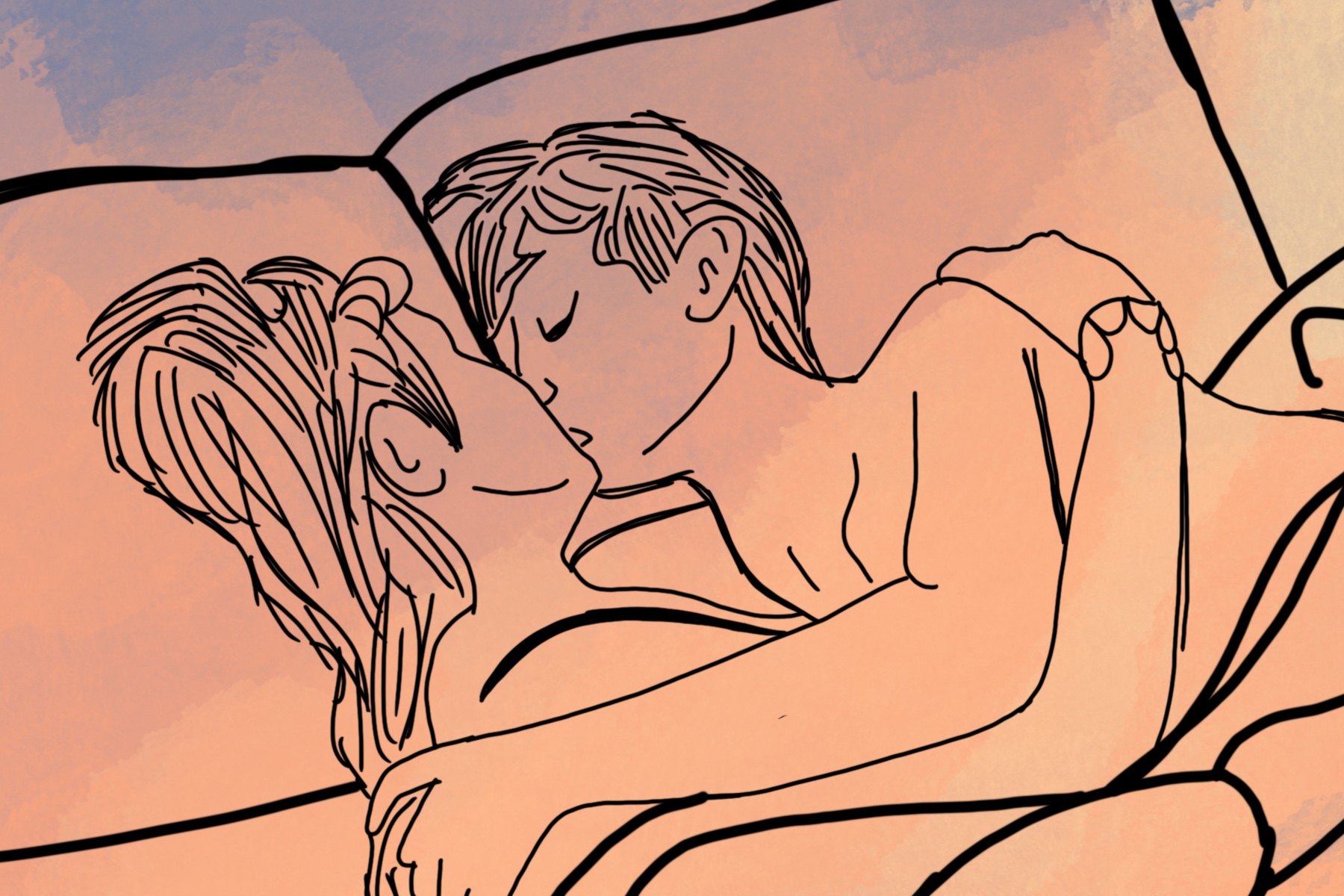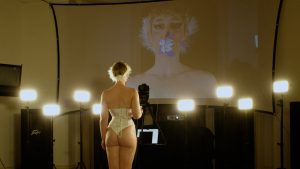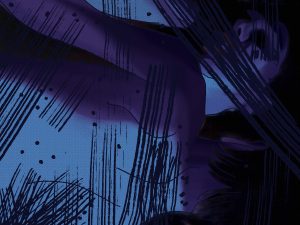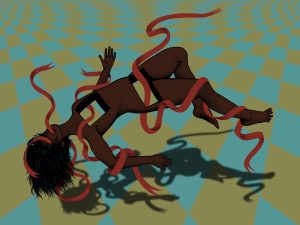“Do you know how to pray?… Not pray the Lord’s Prayer, but ask something of yourself, ask the maximum of yourself?”
Ulisses, an esoteric philosophy professor with whom women easily fall in love with, asks his lover Lóri this question in Clarice Lispector’s romantic novel An Apprenticeship, or the Book of Pleasures. He asks her this after admitting he may be wasting his time waiting for her to overcome her inhibition — to recognize she is the insurmountable mountain in her path to loving and being loved. Yet, Ulisses is undecided. He speculates that there may be no more worthwhile use of his time than waiting for Lóri to surrender. She is a lonely, suicidal, primary school teacher whose only company is the fortune teller she visits now and then and the maid who spends hours tidying her house and preparing lunch and dinner. Lóri questions her desire to be possessed by Ulisses, terrified of disrupting the comfort of her loneliness by indulging her longing for intimacy. She wonders: “Did she want salvation?…If salvation was what she was hoping for from Ulisses, would that be asking so much and so big that he’d decline?”
Do I know how to pray? Have I ever asked the maximum of myself? I prayed for the first time in years the night you revealed, without sentiment, that the first time you said “I love you” was after receiving a handjob in a car on New Year’s Eve. When you asked if I’ve ever said it to a lover, I deflected with a half-assed joke, “I’m waiting until marriage like a good Christian.” But this isn’t entirely true. I’ve been standing at the edge of it the past few weeks like a pigeon that stands several paces away from a picnicker, watching crumbs from a sandwich plummet to the ground, until its appetite overpowers its innate sense of fear.
I admitted it first to a new friend while she pulled a tarot spread, laying the cards between us on her bed. The only interpretation I could offer pointed to my agonizing revelation. I flushed with embarrassment because I realized you may be the first person I would have admitted this to, but I felt the window where you may have reciprocated the feeling passed.
I confessed it to your sister while waiting to order a grapefruit tequila at the bar, “After I broke up with him, I realized, ‘Oh shit, I actually might love him.’” I mouthed the word love to her as if vocalizing it would make it corporeal, like being a child and huddling in front of a mirror with other children, daring each other to repeat the name “Bloody Mary” thirteen times until someone screams and swears on their mother’s life they saw her reflection; a lesson in the power of language to conjure reality.
I imagined saying it to you for the first time while I feigned being asleep, Lispector’s book unconvincingly propped beside me. My arm was positioned so it would gently press my breasts together, emphasizing my almond-colored nipples, hoping I might appear serene and tantalizing — a sight that would inspire you to crawl in bed beside me and whisper it first. Instead, you were incredulous, “Wake up, I know you’re faking.”
Your accusation stung because it revealed the foolishness of my belief that I could somehow arrange my body in a position where I would become irresistible to you. My imitation of natural coquettishness failed, and the accompanying pain was manifold: recognizing that I don’t understand you followed by a pang of embarrassment that you see my desire as flagrant or suspect, a machination. Did I have anything to offer you, except my body?
We laid together in silence. You wore all your clothes as usual, including your jacket, making my near nudity feel vulgar. Your wordless repudiation filled me with shame. I was overcome by an urge to conceal my body even though you had seen me naked countless times. I grabbed an oversized t-shirt from my laundry hamper and put it on before walking you downstairs to the front gate. You placed a hand on my shoulder, “Don’t be a stranger.” You left.
My worst fear, Am I becoming a stranger to you?
“Are you awake?” I waited for your response after stumbling back from a night of drinking $1 beers at the bar with my roommate and collapsing into my bed. I briefly hid my phone beneath my pillow, frightened by the intensity of my need and embarrassed because we’d spent the entire weekend together.
Your text was brief, “Not really lol.” The sob caught in my throat, and I clawed my neck, the sharp pain of my fingernails a physical manifestation of my anguish. I cried until I began to pray, feverishly. Save me from this purgatory, this ambiguity. The last time I prayed with this desperation, I was a pizza-faced teenager, and my parents were fielding phone calls from debt collectors who threatened to foreclose on our home. My prayers, truth be told, were bargains. Kneeling beside my bed, I pleaded. God, if you prevent my family from becoming homeless, I promise I will stop masturbating to gay porn. I will devote myself to you fully. A promise I broke that same night, wiping cum on the underside of my comforter. We were never evicted. Yet, I am perturbed by my lack of self-restraint and discipline. How might I explain my own contradiction? An adolescent lack of willpower, most obviously. But there is something deeper. A fundamental cynicism. A lack of faith. Yet, I continued to pray.
When Ulisses first sees Lóri, she is waiting in the street for a taxi. He immediately suspects she will be good in bed. He approaches her, makes small talk about how hard it is to find a taxi at that time of day, and offers to drive her wherever she wants, an offer she accepts without reluctance. They are on the road for five minutes before Ulisses invites her to have a whiskey with him, an offer she accepts without reluctance. This is the arrangement of their early relationship, it is always he who decides, monolithic.
How did you similarly come to hold all the power in our relationship? I loathed your mute, indecipherable desire and, even more so, I loathed how often I came to hate you while still doing everything within my means to make you want me. Occasionally, you would divulge a quality or feature you found attractive in other women, and I was overly attentive to these revelations — like a dog who sits and salivates beneath the dinner table, alert for any movement that might suggest someone has taken pity and snuck it a scrap of food. If I refashioned myself to appeal to your particular tastes, I imagined I could live out my passion the same way I write — determined to get every minute detail right.
We laid on the concrete steps near Montrose Harbor one unseasonably warm October afternoon. I watched a common loon dive underwater and disappear for several minutes, which I excitedly pointed out to you before realizing you had fallen asleep using your towel as a pillow. I read while you napped. When you woke up, you were unusually playful and told me how irresistible you find schoolgirl outfits after you noticed a girl in a miniskirt further down the lakefront. That same night, I donned a pleated skirt, pink knee-high socks, and heeled loafers before we left for the art gallery, hoping my outfit might finally tempt you enough to break the physical embargo between us. During the performance, we watched the artist briskly remove their pants and pull a bundle of nails from their vagina. They placed a single wine glass on the floor, squatted above it, and pissed. Once the glass was full, the artist asked volunteers from the audience to help them pour glasses of white wine and disperse them to the audience. They invited us to raise our glasses in cheers. Salut.
You leaned closer to me and whispered, “She’s going to drink it.” For a moment, I worried I might have found the limit of your open mindedness until I saw your wide-eyed fascination at the artist emptying their overfull bladder until their body started to tremble. I was envious. They’d clearly learned how to ask the maximum of themselves, or at least the maximum of their body.
“I hope so. I would drink it if they asked me to.” But what I actually wanted to say was, I would drink a wine glass full of your piss and make a list of the flavor profile like a sommelier: the golden, buttery squash and sulfurous brussels sprouts we roasted that evening, the salt-rich dehydration. An encyclopedia where each entry is a plea for sentimentality. The smell and taste are inexpressible. Only another person who has experienced it would know what I am feeling. And I want to be the sole possessor of that experience. Almost everything that seems to matter can’t be described, but I would like to tell you how accidentally nudging you with my knee as I stretched out my legs reminded me of standing at a ledge, overcome by the sudden urge to leap.
But I would never dare say this to you.
My restraint in bridging the gap between us, both verbally and physically, became a uniquely tailored damnation. I feared disturbing the precarious nature of our relationship by acting on my desire and arousing resentment on your behalf, which might have led you to stop seeing me. Hence my inaction. The nights you slept over, our bodies close but not touching, I began to feel like a character from Dante’s Inferno, ambling through Hell’s barren plain of sand, scorched by an eternal rain of fire from the heavens with the other blasphemers, sodomites, and usurers. I lay beside you feeling like a bleeding-heart blossom that had split open, my innards spilling out, and I hoped you might ask me to describe the moment. When you didn’t, I turned my back to you and silently cried into my pillow, overcome with a perverse pleasure, knowing my ability to feel pain means that I am freed from indifference. My suffering proves I am capable of immense joy.
While you slept soundly beside me, I prayed you might one day kiss the freckled birthmark above my right hip again and save me from this perdition; I prayed for you to be my salvation. Could you free me from this punishment? You, who are the cause of my suffering. After God cast humanity from the Garden of Eden for defying his sole command to leave the forbidden fruit untouched, the only path back into paradise, into eternal salvation, was to plead for his forgiveness. So, I am pleading for your forgiveness — waiting for you to lead me back to paradise where I might once more plant kisses on your neck and tuck my head into the soft blanket of your chest.
I prayed for a sign that our passion existed and, in an attempt to prove it, I made a list of all the details I am afraid of forgetting: I looked for a bookshelf when I visited your apartment that first night in order to judge your intellectual interests and was shocked to discover there wasn’t a single book in your home — I cried in front of you for the first time while we sat on that children’s playset eating chocolate soft-serve ice cream — I was unable to follow the plot of David Cronenberg’s newest film because I was worried you were freezing in the overly air-conditioned theater — I became lightheaded while we shared a scalding bath and drank your mason jar of ice water in addition to mine — I insisted you wear your climbing harness for me — I recognized your desire to be both smaller and more uncomfortable in your poor posture and joked your hunched shoulders were the reason we were always ID’d at restaurants — I biked an elephant’s pace behind you and was unable to see anything besides the sinewy cylinders of your calves pedaling — I playfully argued with you as we made a definitive ranking of every hot dog restaurant in Lakeview — I smiled when that older couple passed by our blanket cocoon during movies in the park and the man cooed, “Aren’t you two so precious” — I wondered if I should confess that the sight of you crying across from me at the cocktail bar gave me an erection — You confessed, “I just really wanted to be your boyfriend,” and I laid my head in your lap while you cried.
A partial list, but I prefer the way it leaves something to be desired.
To write this list, which I also consider a prayer, I returned to our spot along Lake Michigan. The same spot where my friend and I sat while I considered whether to act on my feelings for you. We dangled our feet above the water, which I attempted to describe even though we could both see it: It’s gray as the rag I use to wipe the kitchen counters before bed and smells mildewy like the damp laundry I forgot to transfer from the washing machine to the dryer. I was pleased to discover Lake Michigan has incurable moods too. Melancholic. Sanguine. Disheartened. Choleric. I googled all these words later to confirm their definitions and search for synonyms that might more accurately describe your absence, which felt unbearable, except I continued to exist.
One afternoon, Ulisses and Lóri meet at a bar. She eagerly tells him how she went swimming in the sea at dawn while no one else was around besides a black dog further down the shore. She wonders why a dog is so free and decides, “Because he’s the living mystery that doesn’t ask itself questions.” Despite her smallness in comparison to the vastness of the sea, she swims without fear. Ulisses understands she has shared an important emotional declaration and asks if she enjoyed the experience; Lóri becomes teary-eyed and confirms his suspicion before pausing, correcting herself. She suggests it wasn’t enjoyment but something else entirely.
Ulisses: “Better or worse than enjoying?”
Lóri: “It was so different I can’t compare them.”
He looks at her closely and says “I love you” for the first time. Lóri’s lips trembled, but she didn’t reciprocate. They sat silently for a moment. Ulisses’s tone changes. He declares that her eyes are bewildering, her face is a mystery. He asks, “Don’t you know how to be alive through pleasure.”
“I almost do. That’s what I was trying to tell you.”
Perhaps I should end this prayer with my first memory of you. I sat beside you in your hammock, trying to decide if we were going to kiss. You told me how you and your high school friends were mischievous pranksters. I exhausted the subject of my religious upbringing and was delighted when you finally asked if I wanted to lay side by side. You timidly pressed your lips to mine the way you might gently close kitchen cupboards at nighttime, afraid of making a sound and having to explain your craving at such an odd hour.
As the sun set, you offered to make me dinner and I accepted. However, you suggested we should swim first. I was hesitant, but you managed to convince me. We stripped down to our underwear and jumped into the icy water. I treaded water furiously, hoping the physical exertion would warm my body. We found the peak of a submerged concrete slab that was too small for us to both stand on, but you planted your feet on the rock and allowed me to grip the undersides of your thighs to stop myself from drifting away. Your eyes were the color of fresh soil. We floated like this, gently holding each other until I stopped shivering. The shoreline was empty. The sky was a brilliant peach color that slowly darkened, becoming an infinite periwinkle expanse above us. We were silent. I didn’t dare describe the pleasure of this moment to you.
It was different from enjoyment. No words could encompass it.
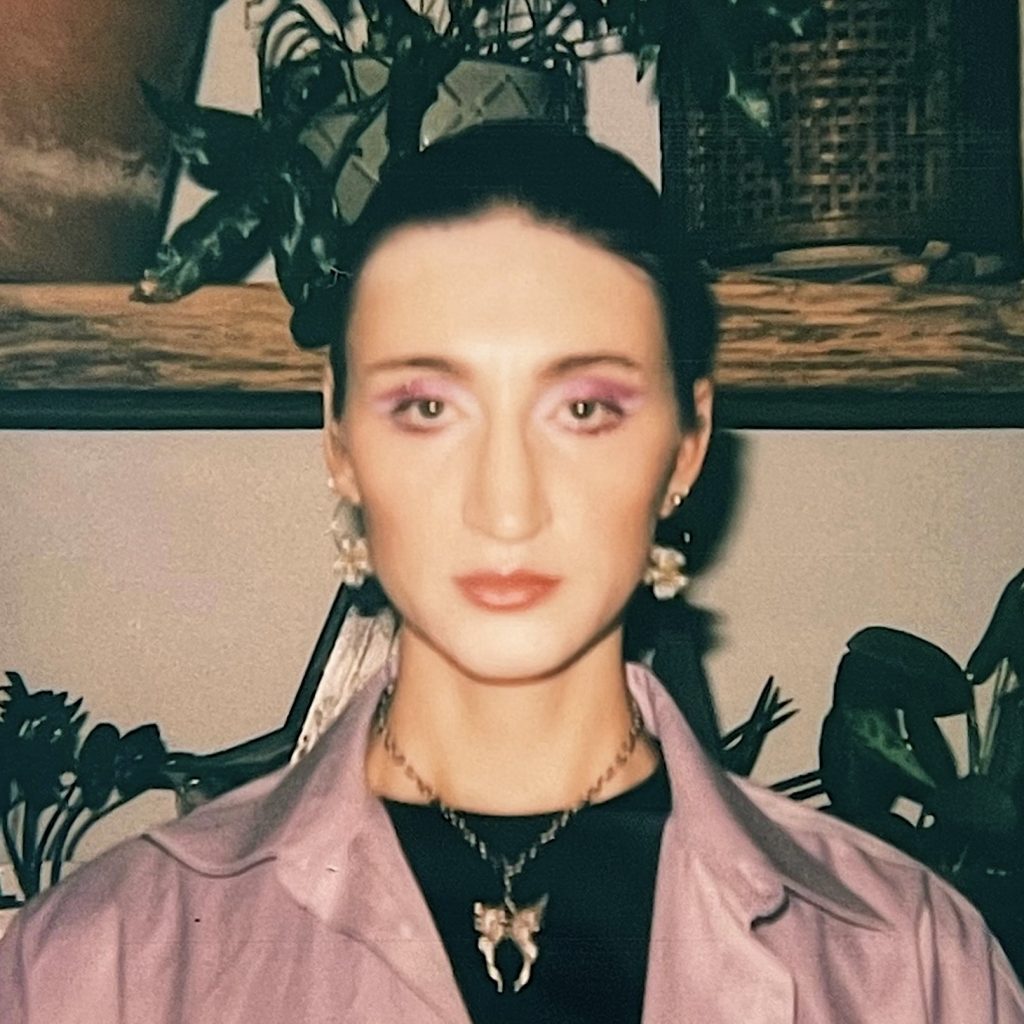
About the author: Riley Yaxley is a writer whose tenderhearted work evokes memories in order to contemplate the self and the ways we make sense of the world and our place in it. They’ve written about topics such as motherhood and trans maternity; gender, sexuality, and desire; and the imperial history of philanthropy in the US. Riley’s work has appeared in Catapult, Sixty Inches from Center, Chicago Gallery News, and the School of the Art Institute of Chicago’s journal of arts administration & policy. They are currently an editor for Sixty Inches from Center.
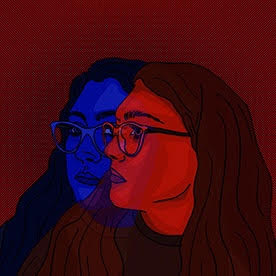
About the illustrator: Sammi Crowley was born and raised in the rural suburbs of Detroit. She received her BA in Fine Art from the University of the District of Columbia and aims to create images where the viewer has the distinct sense of encountering a memory they thought they’d forgotten.
